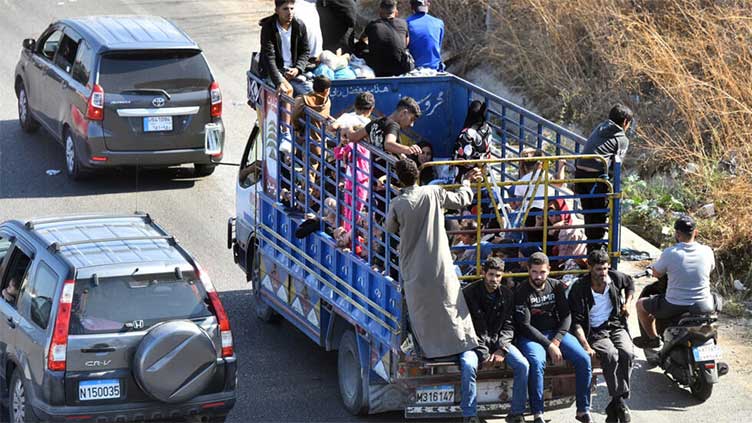UN says tens of thousands flee Lebanon strikes

World
Tens of thousands of people have fled homes in Lebanon as Israeli strikes pummelled the country.
GENEVA (AFP) – Tens of thousands of people have fled their homes in Lebanon as Israeli strikes pummelled the country, the UN said Tuesday, calling events "extremely alarming".
"We are gravely concerned about the serious escalation in the attacks that we saw yesterday," UN refugee agency spokesman Matthew Saltmarsh told reporters in Geneva.
"Tens of thousands of people were forced from their homes yesterday and overnight, and the numbers continue to grow," he said.
Israeli air strikes killed at least 558 people on Monday, including 50 children and 94 women, according to Lebanon's health ministry. At least four healthcare workers were killed and 16 paramedics injured, the World Health Organization said.
Hezbollah and Israel have been locked in near-daily cross-border exchanges of fire since Palestinian militants Hamas staged an unprecedented attack on Israel on October 7.
Monday's bombardment of Lebanon was by far the largest since the war between Israel and the Iran-backed militant group in mid-2006.
Several UN agencies said they were ramping up their aid in Lebanon to address a situation that was already dire before the escalation.
'UNACCEPTABLE'
"This is a region that has already been devastated by war and a country that knows suffering all too well," Saltmarsh said.
He pointed out that even before the air strikes, there had been significant displacement from southern Lebanon.
"The situation is extremely alarming. It is very chaotic," he said.
"The toll on civilians is unacceptable."
Monday's attacks came after an Israeli strike on southern Beirut on Friday killed dozens, including two senior Hezbollah commanders. Days earlier, coordinated communications device blasts that Hezbollah blamed on Israel killed 39 people and wounded almost 3,000.
Since last week, nearly 6,400 people had been injured in Lebanon, according to the WHO.
"The hospitals have been crazy challenged in managing the number of injuries since last week," WHO's representative in Lebanon, Abdinasir Abubakar, told reporters.
Speaking by video from Beirut, he said more than 90 percent of the wounds suffered last week when pagers used by Hezbollah exploded across Lebanon "are on the face and limbs, especially hands".
"Many people had both eye and hand injuries, which required two different sets of operations," he said.
"This is not normal," insisted Ravina Shamdasani, spokeswoman for the UN rights office.
"When you have people losing their eyes and when you have hospitals not able to cope with the amount of amputations that they need to carry out ... (it) is extremely abnormal."
She said the rights office was "extremely alarmed by the sharp escalation of hostilities", calling on "all parties to immediately cease the violence and to ensure the protection of civilians".
The UN children's agency decried the impact on young people in Lebanon.
"We are warning today that any further escalation in this conflict will be absolutely catastrophic for all children in Lebanon," said Ettie Higgins, UNICEF deputy representative in Lebanon, speaking from Beirut.
"Yesterday was Lebanon's worst day in 18 years. This violence has to stop immediately, or the consequences will be unconscionable."


